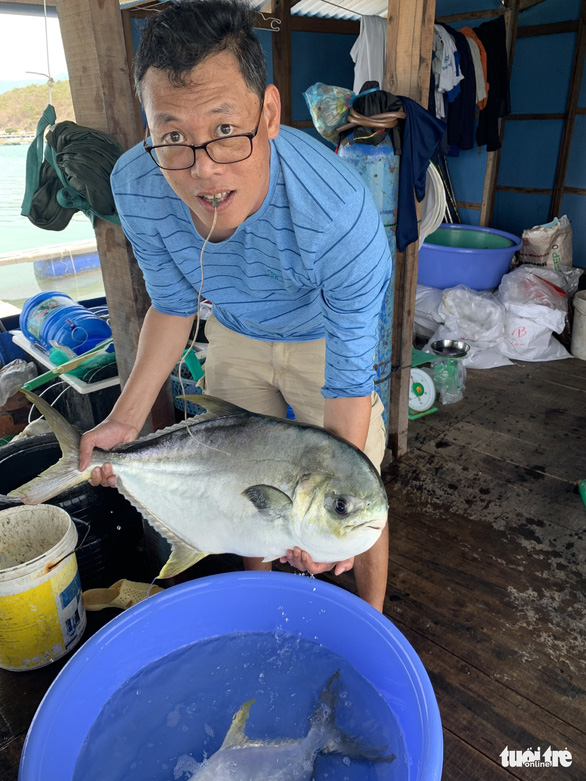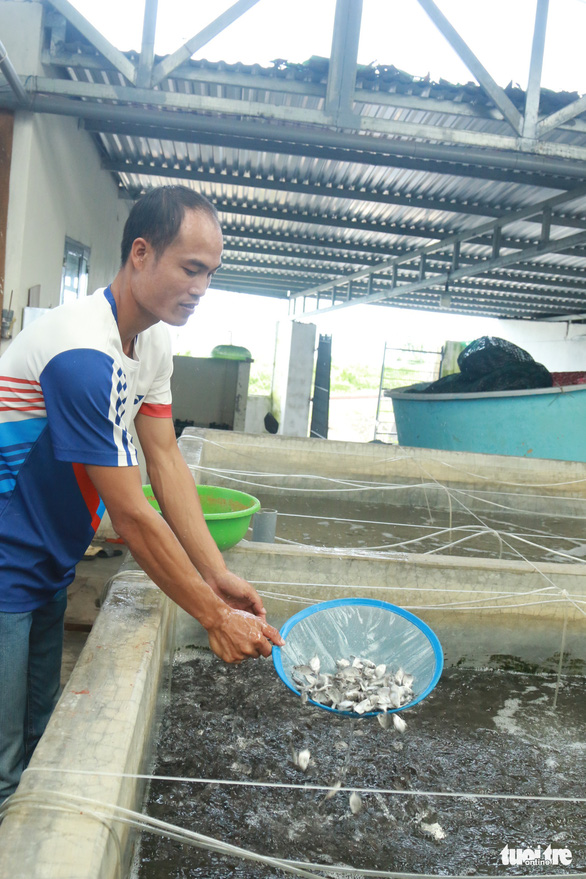A PhD degree holder in fish farming techniques has spent years working on artificial breeding of marine fish before supporting local farmers in techniques and regular guidance. His work is recognized by colleagues and has inspired generations of students.
“Simplifying the steps is crucial in the research and development of the production line and commercial fish farming,” said Ngo Van Manh, a 44-year-old lecturer at the Nha Trang University (NTU) in central Vietnam.
“That way, the local fish farm owners can easily apply the techniques in their actual practice.”
Currently, the establishment for researching fish breeds and farming techniques within the Aquatic Farming Institute, a part of NTU, is under the administration of Dr. Manh.
There is no science without finance
Trachinotus blochii, commonly known as the tropical pompano, is suitable for long-term commercial breeding, according to a recent PhD proposal in the field of fish farming.
This fish, once mass produced in coastal provinces, can create jobs for thousands of people. It has become a major marine species for fish farmers.
Over time, farm owners have been trained to raise and breed this type of fish. Also, products from it have been put on trial for customers’ feedback.
 |
| Ngo Van Manh, a 44-year-old lecturer at Nha Trang University, has his mind on helping the local community. He is seen performing an artificial breeding technique for the tropical pompano. Photo: Hai Luan / Tuoi Tre |
According to a government scheme, the tropic pompano is to be commercially raised until 2030, with a vision until 2045.
“The tropic pompano meets all the needs for large tank farming under the marine industry guidelines,” said Vo Thien Lang, vice president of the Vietnam Fisheries Association.
There is a farm in Nha Trang City of Khanh Hoa Province with 300 tanks for fingerlings, parent fish and fish for sale.
This establishment researches and transfers technology to farmers in the raising of such fish like the Trachinotus blochii, red drum, groupers, giant trevally, golden trevally, and blackspotted croaker.
One can see dozens of fish tanks of different sizes in the breeding center.
There are so many fish in the tanks, a visitor can easily pick up a bunch of tiny fish.
“This lot of fish will serve the fish farmers in Thua Thien-Hue, Quang Nam, Phu Yen, Khanh Hoa and Ba Ria-Vung Tau Provinces,” said Nguyen Van Vinh, a technician at the premises.
“For the last year of COVID-19, fish keepers experienced a boost in fish feed prices, while the earnings from their produce was lowered.
“However, we maintained the scope of our production and even dropped the prices in order to support these fish farm owners,” Vinh said.
By 2006, coastal people from central Quang Binh Province to Kien Giang Province in the Mekong Delta had no experience with the tropical pompano.
At that time, it was piloted only by Marine Fams ASA Vietnam, a Norwegian company in the Van Phong Bay, Van Ninh District, Khanh Hoa Province.
“In 2007, Associate Professor Dr. Lai Van Hung, dean of the aquatic farming department at NTU, paid the Norwegian company a visit,” said Dr. Manh.
“He saw that the fish was doing well with them, and realized their potential, so he purchased 50 specimens of two to three kilograms for breeding as parent fish.”
“After a while, he selected a group of highly prolific parent fish and rented a shrimp farm as a place for the larval stage. The fish were prolific at birth, but due to low experience in techniques, only 2 percent survived in the small tank.”
“After that, they were raised in larger tanks. The first crop was 10,000 specimens. Dr. Hung called for feed donations for the fish through his contacts.”
“When they had grown, there were no buyers though. For the interns working in these tanks as their part-time job, the department had no money to support them,” he added.
Seeing that finance has to be a fundamental part of the scientific path, Dr. Manh came up with an idea.
He created tiny fish info leaflets and distributed them himself to tourists coming to the Cau Da tourist destination in Nha Trang City.
“Over time, a few buyers from Ho Chi Minh City placed their orders. They gave us positive reviews and spread the news to their friends.”
“Once again, we attempted to sell these fish to seaside restaurants in Nha Trang.”
“With growing numbers of orders, we contacted merchants and distributors so that we ourselves can focus on the scientific side.”
Working with the fishermen
Before its popularity with diners, the tropical pompano that could breed in captivity was unknown to the fishermen in Khanh Hoa Province.
To a scientist, breeding the fish and commercially producing it are only half the job well done.
The vital task is for fishermen themselves to be able to access high quality breeds and make profits from them.
Dr. Manh went on friendly trips to each local farm where he introduced the fish and provided guidelines to farmers.
He reassured these people that the fee for him would be collected only if the fish can yield a profit.
Some were ignorant, while others were keen on the new species. They put in efforts and strictly followed Dr. Manh’s instructions.
Every time a fisherman asks him about fish farming techniques, he can go on and on.
Sometimes, he even writes down the whole process of fish farming instructions in the friendliest manner for them to bring home.
Dr. Manh keeps close contact with anyone who tries out the fish in their farm.
He goes on field trips to see how they are actually doing.
Thanks to all this support, many farmers began to make profits.
“We worked with him from the toughest days after graduation. We had our degrees, but did not want to leave him,” said Nguyen Van Vinh, a farm manager.
“All the money he earned was poured back into machinery upgrades, renting farms and expanding the scope of production.”
“There are 24 staff members in his facilities, 18 of whom are his students.”
“We run the farm and even manage its finance and administration, even the buying and selling of fish.”
“We trust each other.”
The teacher that inspires
Besides the Trachinotus blochii, Dr. Manh has successfully bred many other like Trachinotus falcatus, Caranx ignobilis, Gnathanodon speciosus, Protonibea diacanthus, Sciaenops ocellatus, and Lates calcarifer.
These types of fish are being reared in the small tanks, so the profits are meager.
According to his colleagues, Dr. Manh is a good teacher who brings about good students and is passionately sharing his work.
Some have even said that students take pride in helping him wash the dishes.
In Vietnam, respecting the teacher is a deep-rooted tradition.
“Dr. Manh is a dedicated scientist who is willing to share his experience in breeding fish for the people of Khanh Hoa Province,” said Pham Dung Phuong, director of the Advanced Marine Breeding Facility, part of the Aquatic Farm Research Institute 1.
“He has a clear understanding of the theoretical principles, so the students find it easy to follow his lectures. On the practical side, he is the one who can actually do what he preaches,” said Tran Duc Phu, head of the Institute of Marine and Fishing Technology under the NTU.
“Students were barely missing in his classes. Every time he had a point to discuss, he illustrated with vivid pictures and told his anecdotes from actual practices,” said Bao Van Ty, one of Manh’s former students who currently lives in Thuan Nam District in Ninh Thuan Province.
“For the internship, the students were fighting for the jobs. Some were feeding the fish, some were replacing the water, some were cleaning the tanks. Even dishwashing was an honorable task.”
Like us on Facebook or follow us on Twitter to get the latest news about Vietnam!



















































